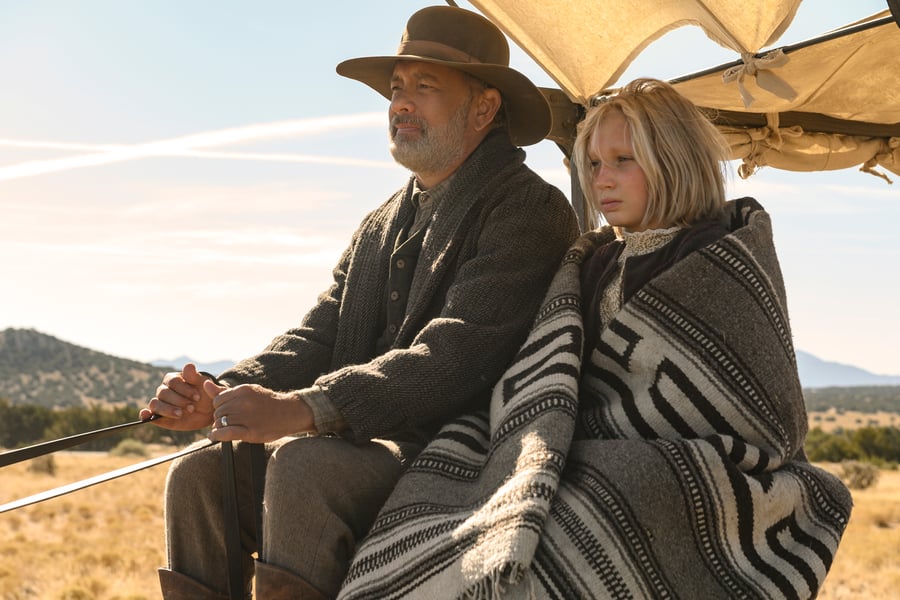A solid, staid, Saturday-afternoon kind of western starring Tom Hanks as an equally solid, stand-up guy on a mission: Sounds about right. The more surprising thing about the movie in question, News of the World, is that it was directed by Paul Greengrass, whose Bourne movies set the template for a decade-plus of ecstatically hyper-visual thrillers and procedurals. That’s not the Greengrass we get in this movie, whose films played like Energizer Bunnies manifest. This movie, like Hanks and Greengrass’s Captain Philips, only excites — quite capably — when it needs to. Greengrass’ trademark efficiency as a storyteller is very much here. But more often the movie sticks to the contemplative: a moody character study with dashes of hillside danger and inner turmoil and post-war social conflict and all the rest — the allspice seasoning of the adult western genre.
And so — grown up, with all the appearances of being wise, like the man at its center — the movie satisfies. News of the World, scripted by Paul Greengrass and Luke Davies after the 2016 novel of the same name by Paulette Jiles, features Hanks as Captain Jefferson Kyle Kidd, a veteran of the American Civil War who, nowadays, travels Texas reading newspapers to local working folk and keeping them all up to speed. It’s a funny sort of job, requiring a man to preach that hearing the latest dispatches will distract the town from its troubles before giving an update on a terrifying meningitis epidemic nearby — and all of that with a straight face. Cpt. Kidd does it, it seems, because it keeps him busy — keeps his own mind off his troubles, which of course he has. Grizzle like his doesn’t come easy, especially not for a man who, nowadays, carries bird shot for ammo.
Cpt. Kidd’s otherwise solitary life is upturned somewhat when he stumbles upon, first, a lynched black man — for historical context’s sake — and young white girl, the dead man’s former passenger. The girl, played by Helena Zengel, is an orphan twice over. She was kidnapped as an infant by the Kiowa tribe and believes herself to be Cicada, daughter of a pair of Kiowa natives named Turning Water and Three Spotted, who are no longer around. She was born a German girl named Johanna Leonberger. After resisting the idea and shuffling his feet for a bit, as any long-solitary veteran-hero likely would, Kidd makes it his mission to return the girl to all that remains of her born family. Not least because of the dangers lurking in this post-war world, with its Union soldiers soldiering around and its nascent Confederate anger.
The things that one expects to happen certainly happen: the growing affection between the girl and her protector; the touching cultural exchanges (she teaches him a few Kiowa words; he reciprocates with a bit of English); the violent flare-ups, the anxieties over a journey full of unknowns. We get a nice cast, too, full of the right kinds of faces — Michael Covino, Bill Camp, Elizabeth Marvel, and others — to keep us committed to the trail alongside our hero pair.
Greengrass seems to see in Hanks what many of the rest of us do: He’s the Henry Fonda of our moment. Not at all because of his looks or manner, but rather because of the equanimity that flows so thoroughly through him in a role like this. He’s the walking archetype of a good, capable man, such that he can play a Confederate veteran who would nevertheless balk at racialized violence against former slaves and local indigenous people — even if so many of the people on either side of him are fire-and-brimstone stereotypes of post-war white disenfranchisement. It’s Hanks’ even keel that makes him suitable for a movie which, in the manner of its hero, plays it straight, hits it all right down the middle, doesn’t dwell overly much on the troubled circumstances from which, ironically, its entire drama arises. It goes there without going there; the inner dramas at the movie’s center smooth it over like so much desert wind. James Newton Howard’s score swells, Dariusz Wolski’s sand-swept images grow wide and sturdy, and the show goes on.
We get to see Hanks do a bit of everything, here. He plays father and protector, shoots to kill when he has to — but only, nowadays, when he has to — and evokes a man with a past that’s more recklessly violent than his present. It’s a familiar enough type of man for this genre for it to feel like a mandatory bar for an actor of Hanks’ stature and style to clear. He clears it well. The movie drags a little when it isn’t veering into its action set pieces, and there’s something far darker than what’s presented hovering just beyond the edge of every frame. That’ll be a nonstarter for some and an invitation for others — and news to no one, either way.
From Rolling Stone US
Love Music?
Get your daily dose of everything happening in Australian/New Zealand music and globally.



































